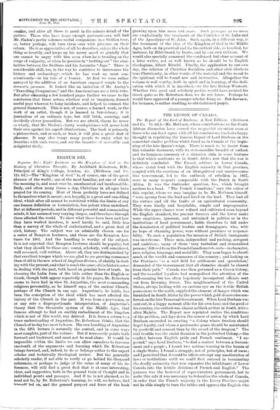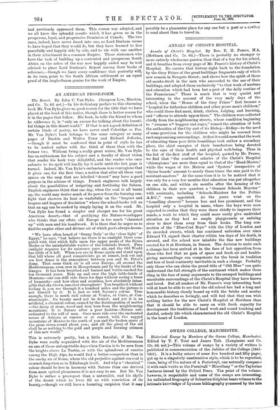THE LESSON OF CANADA.
The Report of the Earl of Durham. A New Edition. (Methuen and Co. 7s. 6d.)—Mr. Methuen, whose contributions to the South African discussion have earned the respectful attention oven of those who can least agree with all his conclusions, has had a happy thought in reprinting the famous Report of Lord Durham on the somewhat similar problem which faced us in Canada at the begin- ning of the late Queen's reign. There is much to be learnt from this valuable document, with its statesmanlike breadth of outlook and its luminous summary of a situation akin in some features to that which confronts us in South Africa now that the war is definitely concluded. The French settlers in Lower Canada, whose racial feud with the English minority in that province, coupled with the exactions of an ill-regulated and unrepresenta- tive Government, led to the outbreak of rebellion in 1837, were in many respects comparable with the Dutch in South Africa. It was the Outlander question, too, which brought matters to a head. " The French Canadians," says the editor of this reprint, whom we may imagine to be Mr. Methuen himself, "were sprung from the land and lived on the land. They had all the virtues and all the faults of an agricultural community. They were kindly and hospitable, simple and unprogressive. While the upper classes were refined and cultivated even beyond the English standard, the peasant farmers and the lower ranks were suspicious, ignorant, and untrained in politics or in the institutions of local government; liable therefore to fall under the domination of political leaders and demagogues, who, with no hope of obtaining power, were without prudence or responsi- bility. To such a population the invasion of British immigrants was unwelcome. These men, independent and pushing, arrogant and ambitious, many of them very turbulent and demoralised persons,' differed from the French Canadians tote caelo--in character, race, religion, language, and social life. They soon began to absorb much of the wealth and commerce of the country ; and looking on the Provinces as a vast field for settlement and speculation,' demanded of the Government that all obstacles should be cleared from their path." Canada was then governed as a Crown Colony, and the so-called loyalists had monopolised the attention of the well-meaning but too often hopelessly incompetent officials sent out from Downing Street. The neighbourhood of the United States, always looking with an envious eye on the fertile British possessions to the north, supplied the element of danger which was furnished in South Africa by the power which gold discoveries con- ferred on the late Transvaal Government. When Lord Durham was sent out, in a happy moment alike for his own fame and the good of his country, the outlook was almost as black as that in South Africa after Majuba. The Report now reprinted recites the conditions of the problem, and lays down the course of action by which Lord Durham succeeded in creating " a Colony where freedom should beget loyalty, and where a profounder peace should be maintained by goodwill and consent than by the sword of the dragoon." The real trouble was the racial disunion in the perturbed Colony,—the conflict between English pride and French sentiment. " I ex- pected," says Lord Durham, "to find a contest between a Govern- ment and a people ; I found two nations warring in the bosom of a single State; I found a struggle, not of principles, but of races; and I perceived that it would be idle to attempt any amelioration of laws or institutions until we could first succeed in terminating the deadly animosity that now separates the inhabitants of Lower Canada into the hostile divisions of French and English." The panacea was the bestowal of representative government, but to make this safe it was necessary to federalise the whole of Canada, in order that the French majority in the Lower Province might not be able simply to turn the tables and oppress the English who
had previously oppressed them. This course was adopted, and we all know the splendid results which it has given us in the prosperous, loyal, and progressive Dominion of Canada. The two races, indeed, have never fused into one, as Lord Durham seems to have hoped that they would do, but they have learned to live peacefully and happily side by side, and to vie with one another in their attachment to a common Empire. Those statesmen who have the task of building up a contented and prosperous South Africa on the ashes of the war now happily ended may be well advised to place Lord Durham's Report among their books of reference,—though wo have every confidence that posterity will, in its turn, point to the South African settlement as an equal proof of the Anglo-Saxon genius for the work of Empire.



















































 Previous page
Previous page